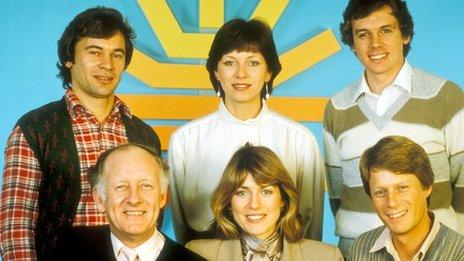Happy Birthday, Breakfast - and newsroom computers
- Published
- comments

Happy Birthday to BBC Breakfast. It is 30 years since the UK's first early morning television news programme went on air - and it has got me feeling pretty nostalgic. Because it was at Breakfast Time - as it was then called - that I first got my hands on a computer back in 1983.
I'd arrived in a job as a sub-editor in the BBC TV newsroom at Television Centre, from a regional newsroom where the air was thick with cigarette smoke and the sound of clattering typewriters. The TV Centre operation was much bigger - but the technology was hardly any more sophisticated.
Middle-aged men (news was still mostly male), puffing away on pipes, often wrote scripts in longhand and then dictated them to a typist. Graphics were made using card and Letraset, with "animates" involving the operator simply pulling out a strip of cardboard to reveal what was underneath.
Then, in March I was sent down the road to Lime Grove to work on the night shift writing news bulletins for Breakfast Time. The office in this extraordinarily ramshackle building was just as noisy and smoky as any other newsroom - but while there were plenty of typewriters, the news team was sitting in front of a row of impossibly futuristic machines.
The new computers - perhaps the first to be introduced into a major British newsroom - would look laughable to today's young journalists. My memory is that they were chunky machines, operated solely by keyboard - no mouse - with a screen where a blinking cursor invited you to fill in various boxes with your script. They had inbuilt printers, so once your script was finished you pressed a button and it came slowly spewing out of the top on a roll of shiny paper.
A former colleague in BBC News has found more details of the system in a report from the 1980s on office automation across Europe. It reveals that I was actually sitting not at a "real" computer but at one of 28 dumb terminals, linked to "two Hewlett Packard 44 series minicomputers, a master central processing unit and a back-up machine - each with three megabytes of memory...The system handles production of all scripts for the programme, all administration associated with the programme and provides an electronic link to the autocue to enable last minute changes."
Breakfast Time - a two and a half hour live daily news programme - was an unprecedented challenge for the BBC back then and the documents says the system had been conceived "at an early stage in the planning of the programme as a means of support to the extra scriptwriting and complex programme management required for a programme of this length."
Original Breakfast Time presenter Nick Ross: "The atmosphere before we went on air was so tense"
Now my memory is that once we'd completed our scripts, they were printed out a second time and a team of assistants carried them up the fire escape which was the quickest way to the sixth floor studio at Lime Grove. So, the impact of the new technology on productivity was not that dramatic. But, along with the revolutionary computer graphics that powered Francis Wilson's weather forecasts, Breakfast Time was a harbinger of the hi-tech future of news.
And a couple of years later, a much better newsroom computer system called Basys arrived at Television Centre and went on transform the way news teams went about their work. But only after we journalists - including a future technology correspondent - went out on strike over the introduction of the beastly machines. Our rivals at ITN had been promised £1,000 to cope with the added stress of computer working - and we eventually settled for around half of that.
Three decades on, a new revolution is taking place in offices over technology. This time, rather than trying to keep them out, workers are demanding more choice over exactly how they use computers or smartphones. Today's journalists - and many other workers - have learned that unless you are in charge of your own technology, you risk being written out of the future.